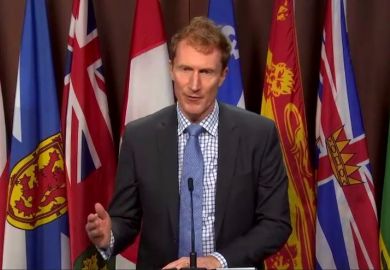Canada has announced more changes to its post-study work permit programme, including insisting that some of its international students must have studied a course in one of five areas to qualify for a visa.
Immigration, Refugees and Citizenship Canada (IRCC), which has been tasked with bringing down the international student population, last month announced that the number of new international study permits would be reduced by a further 10 per cent.
In its latest update, the body said applicants for the Post-Graduation Work Permit (PGWP) will now also be required to demonstrate English- or French-language proficiency to help them “transition to permanent residence and adapt to changing economic conditions”.
From 1 November, all current and future PGWP applicants will need to prove that they meet new language level requirements. Graduates from bachelor’s degrees, master’s degrees or PhD programmes must achieve a Canadian Language Benchmark (CLB) level 7.
These students will be unaffected by the other major change to the programme, but those attending colleges or taking university courses below degree level must now graduate in a field of study linked to certain occupations where there are long-term shortages to be eligible for a visa.
IRCC has produced a list of 966 occupations across five broad categories – agriculture and agri-food, healthcare, science, technology, engineering and mathematics (STEM), trade and transport – and said students wanting a visa must have studied courses aligned to these.
Meti Basiri, co-founder and chief executive of ApplyBoard, said that while aligning PGWP eligibility with labour market needs could benefit students, institutions and the Canadian economy, there were many programmes “students are taking that are critical for Canada’s labour market which have been excluded”.
“While we’re thankful that these PGWP changes will have minimal impact on current international students – and those that have already submitted a study permit application – these changes will have lasting impacts on Canada’s international education sector and economy,” he added.
Figures from ApplyBoard show that access to a post-study work visa is a vital consideration for many prospective international students, with almost half of respondents to a recent survey listing post-study visa opportunities as a top priority in choosing where to study.
The Trudeau administration has said its student number cap, along with higher wealth requirements and new working regulations, is intended to combat concern around disreputable institutions and chronic housing shortages. However, the sector has warned that it will lead to big financial challenges for universities.
Register to continue
Why register?
- Registration is free and only takes a moment
- Once registered, you can read 3 articles a month
- Sign up for our newsletter
Subscribe
Or subscribe for unlimited access to:
- Unlimited access to news, views, insights & reviews
- Digital editions
- Digital access to THE’s university and college rankings analysis
Already registered or a current subscriber?








